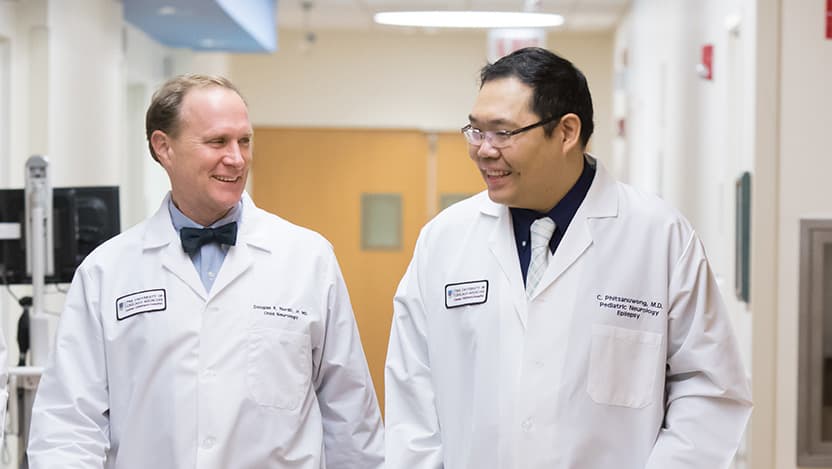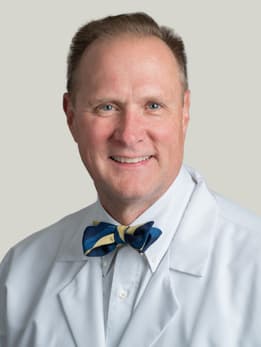A new path to epilepsy treatment in children

In the past, clinical epilepsy studies performed mostly in adults suggested that patient outcome was not affected by how quickly patients were treated. Physicians generally waited to see if their patients had another seizure before starting treatment, and then paused to see if several medications failed their patients before sending them to an epileptologist.
That could mean six months or even two years of continued epilepsy. We didn’t always realize that at that point, the impact of persistent epilepsy on a developing nervous system could be catastrophic.
Since arriving at the University of Chicago Medicine Comer Children’s Hospital in 2018, one of my priorities has been to establish the New Onset Seizure Clinic so that children experiencing seizures can be rapidly seen and evaluated by a team with special expertise in pediatric epilepsy.
The concept behind the clinic is simple: every child diagnosed with epilepsy should see a specialist at least once, and preferably at the start of their illness. If they’re likely to have a stable course, they can be referred back to their community physicians, where they can be very well cared for. We call it a reverse referral concept. Since the clinic’s opening, there have been numerous success stories of patients being rapidly diagnosed, appropriately treated and who are now living seizure-free.
We have more tools at our disposal for diagnosing and treating epilepsy, so the situation has changed dramatically from when I started caring for patients in the 1980s. Between surgical, imaging and genetic advances, dietary treatments, microbiome research and autoimmune regulation, the possibility of eliminating pediatric drug-resistant epilepsy by 2030 is within our reach.
The possibility of eliminating pediatric drug-resistant epilepsy by 2030 is within our reach.
Thanks to better precision in choosing medicines, we are on the threshold of figuring out which medications are good for certain genetic conditions. Research on antisense oligonucleotides (ASO) and techniques using stereo electroencephalography, coupled with surgical advances like laser ablation – at UChicago Medicine, more than 150 such procedures have been performed – are helping us to better treat epilepsy and get to previously inaccessible parts of the brain like the insula.
Even time-tested treatments like the ketogenic diet are being used more effectively and earlier in the course of genetically determined epilepsies. In the past, many centers refused to use the ketogenic diet in infants. In 2001, our study in Pediatrics examined the remarkable effectiveness of treating infantile spasms with a ketogenic diet. More recently, the experience from a single center in Chicago (authored by colleagues who are now in South Korea, other parts of Chicago and Michigan), has shown how remarkably effective the diet can be in Foundation for Angelman Syndrome Therapeutics (FAST) went from being scoffed for their hope of finding a cure to being on the threshold of one. Their funding supported critical research that helped set in motion a series of remarkable achievements that may very soon culminate in a definitive treatment. Their sense of urgent need and laser focus propelled these advances. Citizens United for Research in Epilepsy (CURE) is another example of a remarkably efficient organization that funds more pediatric epilepsy research than any other group in the world.
We in academia need to efficiently align our academic missions with these remarkable groups that have been created and continue to be inspired by these highly dedicated parents. These parents want a cure for their children. If we clarify our professional aims, continue to place the needs of all children with epilepsy as the top priority and create effective alliances, I firmly believe we can finally achieve that goal. The next decade could be the best one ever for children with epilepsy.

Douglas R. Nordli, Jr., MD
Douglas R. Nordli, Jr., MD, is a child neurologist specializing in early-onset epilepsy and a co-director of UChicago Medicine’s Comprehensive Epilepsy Center.
Learn more about Dr. Nordli
Our Level 4 Pediatric Epilepsy Center
At Comer Children's Hospital, we offer the skill, experience and technology to definitively diagnose childhood epilepsy. Our team of experts provides the highest level of medical and surgical care for complex epilepsy in children of all ages.
Childhood Epilepsy & Seizures